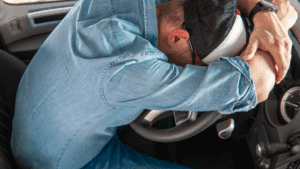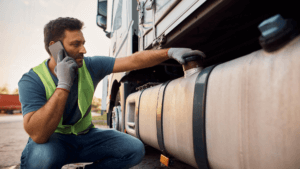Picture this: you’re cruising down the open road in your RV, enjoying the freedom and adventure that comes with life on the go. But suddenly, disaster strikes – a flat tire, a leaking roof, or a broken appliance. What do you do now? In our latest blog post, we’re tackling all things emergency RV repairs. From quick fixes to essential tools to have on hand, we’ve got you covered for when the unexpected happens on your journey. So buckle up and get ready to handle any mishap like a pro!
Fuel Efficiency Tips for Truck Owners: Maintaining Optimal MPG
RV Emergencies and Why They Happen
Owning an RV is a dream for many people, offering the freedom to travel and explore the world on your own terms. However, with great freedom comes great responsibility, especially when it comes to maintenance and potential emergencies. No matter how well you prepare or maintain your RV, there is always a chance that disaster may strike while you’re on the road.
RV emergencies can range from simple flat tires to more serious issues such as engine failure or electrical problems. These situations can be overwhelming and even dangerous if not handled properly. In this section, we will discuss some of the most common types of RV emergencies and why they happen.
Essential Tools and Supplies for Handling RV Emergencies
When you’re on a road trip in your RV, the last thing you want to think about is a potential emergency. However, it’s important to be prepared for any unexpected situations that may arise while on the road. This means having the necessary tools and supplies on hand to handle RV emergencies.
Here are some essential tools and supplies that every RV owner should have in case of an emergency:
1. Basic Tool Kit: A basic toolkit is a must-have for any RV owner. It should include items such as screwdrivers, pliers, wrenches, and a hammer. These tools can come in handy for minor repairs or adjustments.
2. Spare Tires: One of the most common emergencies when traveling in an RV is getting a flat tire. Always make sure to have at least one spare tire on board, along with all the necessary equipment to change it.
3. Tire Pressure Gauge: Along with spare tires, it’s crucial to have a tire pressure gauge on hand. This will allow you to regularly monitor your tire pressure and prevent potential blowouts or other issues.
4. Jumper Cables: Dead batteries can happen at any time, so keeping jumper cables in your RV can be a lifesaver when you need them.
5. Duct Tape: Duct tape may not seem like an essential tool, but it can come in handy for temporary fixes until you reach professional help.
6 Techniques to prevent headlight glare from oncoming vehicles at night
Common RV Emergencies and How to Handle Them
RV trips can be full of unexpected adventures and beautiful memories, but they can also come with their fair share of emergencies. As a responsible RV owner, it is important to be prepared for any potential mishaps that may occur on the road. In this section, we will discuss some common RV emergencies and how to handle them.
1. Flat Tires: Flat tires are one of the most common issues faced by RVers while on the road. They can happen due to various reasons such as sharp objects on the road or underinflated tires. When you experience a flat tire, it is essential to pull over in a safe location and assess the damage.
2. Engine Overheating: Driving an RV puts extra strain on your engine which makes overheating a common problem for many travelers. This issue usually occurs when there is insufficient coolant in your radiator or when driving through hot weather conditions.
3 . Electrical Problems: Electrical problems can range from minor issues like blown fuses to major problems like faulty wiring which can cause appliances or lights to stop working altogether.
4 . Leaking Pipes: Leaking pipes are another common emergency that RVers may face while on the road. This can be caused by various factors such as wear and tear, extreme temperatures, or even rodents.
Tips for Preventing RV Emergencies
Here are some essential tips for preventing RV emergencies:
1. Regular Maintenance Checks: One of the most crucial steps in preventing RV emergencies is regular maintenance checks. Make sure to schedule routine inspections for your RV’s engine, tires, brakes, electrical systems, plumbing systems, and appliances. This will help identify any potential issues before they become major problems.
2. Know Your Weight Limits: Overloading your RV can lead to tire blowouts or damage to other components. Make sure you know your vehicle’s weight limits and stay within them when packing for a trip.
3. Plan Your Route: Before hitting the road, plan out your route carefully and research any potential hazards or challenges along the way. Avoid narrow roads or low-clearance bridges that could cause damage to your RV.
4. Practice Proper Driving Habits: It’s important to drive cautiously when behind the wheel of an RV as they are larger and heavier than standard vehicles. Be mindful of speed limits, avoid sudden braking or accelerating, and take turns slowly.
5. Keep Emergency Supplies Onboard: In case of an emergency on the road, it’s crucial to have necessary supplies readily available in your RV. Some essential items include tools such as jumper cables or a tire repair kit; first aid kit; flashlight; extra water; non-perishable food; and a fully charged cell phone.
How to Check Your Truck’s Tire Pressure Properly
How to Stay Safe During an Emergency Repair Situation
Emergencies can happen at any time, and when you’re on the road in your RV, it’s important to know how to stay safe during an emergency repair situation. Here are some essential tips to keep in mind when disaster strikes.
1. Have a First Aid Kit Ready: Before embarking on your RV trip, make sure you have a well-stocked first aid kit on board. In case of an emergency repair situation, this will come in handy for treating minor injuries or providing temporary relief until professional help arrives. Some items that should be included in your first aid kit are bandages, antiseptic wipes, pain relievers, and any necessary medications.
2. Stay Calm and Assess the Situation: In the event of an emergency repair situation, it’s crucial to remain calm and assess the situation before taking any action. Panicking will only add to the chaos and may lead to further complications. Take a deep breath and evaluate what has happened – is there a fire? Has there been an accident? Is someone injured? This step will help you determine what needs to be done next.
3. Move Your RV to a Safe Location: If possible, try to move your RV away from traffic or other potential hazards after assessing the situation. This could mean pulling over safely onto the side of the road or finding a nearby parking lot where you can safely park your vehicle while waiting for assistance.
4. Use Hazard Lights and Emergency Triangles: To alert other drivers about your stationary RV, turn on your hazard lights immediately after pulling over. If needed, place emergency triangles behind your vehicle as well – these reflective triangles will serve as warning signs for other drivers and help prevent accidents.
5. Call for Professional Help: While some emergencies may require immediate attention from you (such as putting out a small fire), others may require professional assistance from mechanics or roadside assistance services. Make sure you have contact information for these services readily available. If you’re in an unfamiliar location, use a GPS or map application on your phone to determine your exact location.
Finding Reliable Help
DIY (do-it-yourself) repairs can seem like an attractive option because they can save you time and money. However, it’s important to assess your own skills and knowledge before attempting any repairs on your RV. If you have experience with mechanical or electrical work, then tackling small issues such as replacing a fuse or changing a tire may be feasible. However, for more complex problems involving the engine or electrical systems, it’s best to leave it to the professionals.
One major downside of DIY repairs is that if not done correctly, they can cause further damage to your RV. This could lead to even more costly repairs down the line. Additionally, if you don’t have all the necessary tools or equipment on hand, you may end up making multiple trips to the hardware store which can add up in terms of time and expenses.
On the other hand, seeking reliable help from professional mechanics or technicians has its own benefits. These individuals are trained and experienced in working on RVs specifically and will have access to specialized tools that may not be available to you. They also have a deeper understanding of how different systems work together in an RV and will be able to diagnose potential issues more accurately.
Ultimately, whether you choose DIY or seek professional help depends on your comfort level with handling repairs as well as the severity and complexity of the issue at hand. It’s always a good idea to have a basic understanding of your RV’s systems and how to troubleshoot minor problems, but for major issues, it’s best to leave it to the experts. Don’t hesitate to reach out for help when faced with an emergency RV repair situation.
For more tips and info, follow us on Facebook and Instagram. Call us for truck repair road service on: elluminatemobiletruckrepair.com






